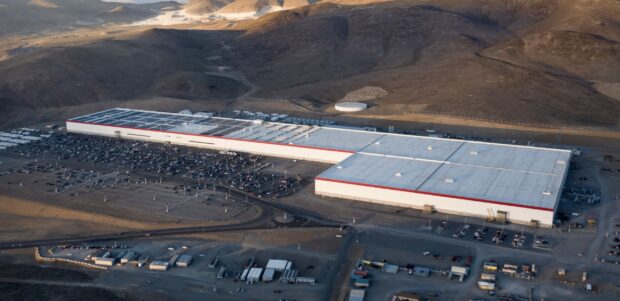HOME | ABOUT US | MEDIA KIT | CONTACT US | INQUIRE
HOME | ABOUT US | MEDIA KIT | CONTACT US | INQUIRE
A battery-production monolith made impacts that weren’t all positive.

As the smiles spread and the smack of high fives greeted ground-breaking for the Panasonic Energy battery plant in DeSoto, Kansas, officials from the company and state and local governments joined economic development czars in a unified message about a development they all say will be transformative.
Proof of that lies 1,600 miles to the west, where the battery maker built its first U.S. plant, in tandem with Tesla, in 2017.
“Reno, Nevada, which is 75 percent smaller than the KC region, is still realizing the growth for its community due to the Tesla/Panasonic Gigafactory 1,” said Tim Cowden of the Kansas City Area Development Council. “Beyond the 10,521 new jobs at the facility itself, within five miles of the site, nine companies have located in that area. The Reno region saw more tech, manufacturing, data center, and logistics development along with residential growth leading to a ripple effect increasing retail, restaurant, and hospitality industries.”
True enough. But inside those stats are clues that should have the Kansas City region on notice: The challenge has only just begun. For things in the Reno area haven’t gone quite the way the community had hoped.
“Nobody,” says Ann Silver, “ever looked at the unintended consequences” of building the massive plant in suburban Sparks, Nev. That’s where she leads the Chamber of Commerce, most of whose members, Silver says, would think differently about supporting a project of that scale if they could do it all over again.
Why? For one, the impact on other small businesses as two vastly larger employers set up shop and completely reconfigured workforce dynamics—esp-ecially with the availability of talent and compensation structures. Then came the downstream effects of a severe housing crunch, a powerful squeeze on public school enrollments, and traffic problems that continue to defy Interstate 80’s capacity. For starters.
“I sometimes think, in the eagerness to prove our economy was on the rebound, decisions were made with negative consequences,” Silver says. “With the 2,300 companies who are chamber members, about 93 percent of them small businesses, I don’t think one is happy about how things turned out. Groups have tried to suck the workforce from Reno and Sparks into their world, and small business has fought back, raised wages, and created an association health plan to remain competitive. But the dynamic today is quite different.”
Her advice to policy-makers in this region?
“Tough questions should be asked,” she says. “It’s not too late to ask these companies what they intend to do about housing, transportation, and child-care availability. They’ll promise the world, but it’s taken since 2014 to engage Tesla and Panasonic about on-site child care.”
The good news for local governments and businesses that will be in on the coming construction boom is that they have time: The plant isn’t slated to open until 2025. But given the lead time needed for traffic improvements, workforce training programs, new housing, school expansions, and other anticipated effects, not a lot of sand is left in the hourglass.